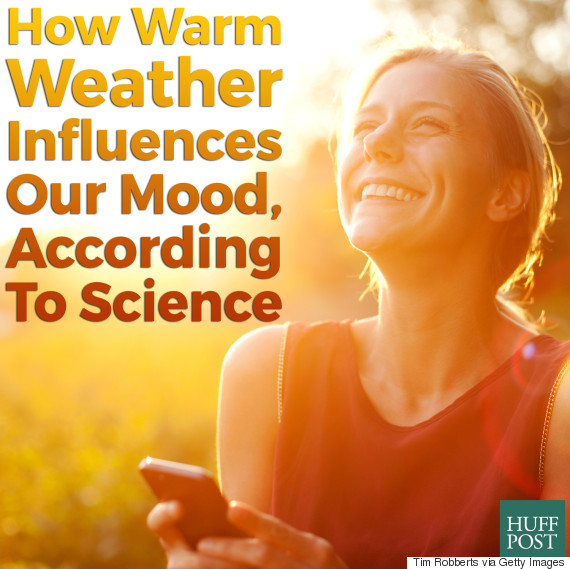
Now that winter weather is behind us, conversations with friends and co-workers are noticeably cheerier and there's a bit more spring in our step (sorry).
That mood shift is not just our imagination. There's just something about springtime that has a small influence, positively and even occasionally negatively, on our mindset. Below are just some of the ways the warm weather can affect our attitudes.
Spending time outdoors when it's sunny is linked with a mood boost...
The gold standard on this subject is a 2004 University of Michigan study that found people who spent at least 30 minutes outside in pleasant weather -- either by taking a trip to warmer climates in the winter months or by taking advantage of a newly warm spring day in the park -- had happier moods. And in corroborating research, a 2014 UM study found that being outside could lead to a better mindset and reduced stress.
But if you're still stuck in the tundra, don't worry too much. Kelly Rohan, Ph.D., a professor of psychiatric science at the University of Vermont, points out that weather pales in comparison to other stress mitigators, such as the lessening of relationship or work pressures. While warmer weather doesn't make a sizable difference in outlook, research supports the idea that nice weather has a positive psychological impact on the overall population, she told The Huffington Post.
...But don't expect the same effect on the dog days of August.
The weather-mood connection is a positive one, up to a point. The original University of Michigan researchers also noted that positive attitudes seemed to wilt in particularly sweltering weather -- an idea that's also supported by other research conducted on climate and mood change.
Despite the fact that summer brings sunnier days and brighter colors, people are at a greater risk for heatstroke and dehydration during the warmer months, Brent Solvason, M.D., a Stanford University clinical associate professor of psychiatry and behavioral sciences, told HuffPost.
"There's clearly a sense of discomfort because of the oppressiveness of the heat," he said. Both dehydration and heatstroke can have an influence on mood or behavior and, at their worst, can also damage the brain.
We're generally happier when the days are longer...
Daylight Savings Time may bring a series of grumbles -- "What do you mean we lose an hour of sleep?!" -- but it does have one positive perk: More sunlight.
"People simply feel better on longer days and when there's more available sunshine," Rohan said. "The winter variety of seasonal affective disorder (SAD) is mostly tied to how long the day is. So even though spring was a little slow coming this year... the days are still long. Those extra hours of sunlight make a really big difference."
...But some people are more susceptible to depression during warmer months.
While it's much less prevalent than the winter variety of SAD, some people do suffer from spring and summer SAD. Diagnosing and treating the disorder can be complicated, Solvason notes, mainly because conducting research on this specific type of depression is more challenging.
Experts theorize that warmer-weather SAD is aggravated by excessive heat and humidity, Rohan said. "Those triggers are really different than wintertime, which is brought on usually by lack of light and shorter days," she explained. "It's really a few people that we're talking about as opposed to the wintertime SAD people can relate to on some level, but it does happen."
On the plus side, warm weather may make you more inventive.
The University of Michigan study also found that being outdoors in enjoyable climates can improve memory and broaden cognitive style, which is linked to more creative thoughts.
"Being outside in pleasant weather really offers a way to reset your mindset," said Matthew Keller, one of the study's authors, when the research was released. "Everyone thinks weather affects mood, but the biggest tests of this theory ... found no relationship, so we went back and found there are two important variables: how much time you spend outside and what the season is. If you go from winter to spring and spend enough time outside, there's a noticeable change."
___________________
If you or someone you know needs help, please call 1-800-273-8255 for the National Suicide Prevention Lifeline. If you are outside of the U.S., please visit the International Association for Suicide Prevention for a database of international resources.
___________________
If you have a story about living with mental illness that you'd like to share with HuffPost readers, email us at strongertogether@huffingtonpost.com. Please be sure to include your name and phone number.